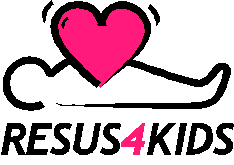Resus4Kids – Paediatric Life Support for Healthcare Rescuers
Resus4Kids – Paediatric Life Support for Healthcare Rescuers is a blended learning program. It is comprised of an e-Learning module followed by a 90 minute practical session. Participants must successfully complete the e-Learning module and receive a pass mark of 19/22 in the post course test in order to attend the practical session.
The Resus4Kids Short Practical Course is a 90 minute face to face session that provides participants with the opportunity to practise the skills and knowledge covered in the e-Learning. Its brief duration enables participants and instructors to be released from their departments with minimal disruption to patient care. Where possible the Resus4Kids course is taught in an interdisciplinary setting.
The practical course is broken down into 2 components.
The first 30 minutes focuses on communication skills and teamwork with the objective of observing and understanding why good teamwork is essential for good outcomes in resuscitation.
This is followed by 60 minutes in small groups of one trainer to six participants, using a pause and discuss format with various scripted scenarios that Health Care Workers might face in the clinical setting. Scenarios are available for emergency departments, in-patient ward or pre hospital care.
On completion of the Resus4Kids e-Learning component you will be able to:
- respond to an emergency involving a child or infant using the seven steps in the DRSABCD Paediatric Life Support for Healthcare Rescuers model
- understand the techniques required to provide effective rescue breaths and cardiac compressions
- respond to a choking child
- apply a range of advanced airway life support devices including: self-inflating bag and mask, nasopharyngeal airway and oropharyngeal airway
- correctly identify the three main cardiac arrest rhythms
- follow advanced life support procedures using defibrillation and drugs.
On successful completion of the short practical course, participants will be able to:
- manage an infant’s/ child’s airway
- perform effective breathing
- demonstrate effective cardiac compressions
- recognition and initial management of shockable/ non shockable cardiac rhythms
- demonstrate a knowledge of safe defibrillation.
The short practical course also allows students to practice teamwork and communication skills including:
- displaying and using names wherever possible
- recognising a team leader
- team member participation
- allocating and accepting roles
- concise, clear, closed loop communication.
